1460 Results
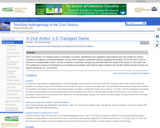
The 'A Civil Action' 1-D Contaminant Transport Game is an EXCEL spreadsheet that enables students to compute concentrations of TCE traveling in the groundwater flow system toward well H that emanate from the W.R. Grace site. The idea of the game is to draw students into learning some of the fundamental concepts about (1) how contaminants move in the subsurface and (2) how models can be used to test hypotheses. These concepts are taught within the context of the famous 'A Civil Action' trial described in the book by Jonathan Harr (1996) and the movie starring John Travolta (1998).
The spreadsheet computes values of hydraulic head, advective flow velocities and traveltimes, contaminant velocities, and contaminant concentrations at 20 locations along the flowpath from W.R. Grace to the Aberjona River. Breakthrough curves showing changes in concentration versus distance and changes in concentration versus time pop-up automatically (see below). The spreadsheet also creates graphs of advective and contaminant velocities versus distance.
(Note: this resource was added to OER Commons as part of a batch upload of over 2,200 records. If you notice an issue with the quality of the metadata, please let us know by using the 'report' button and we will flag it for consideration.)
- Subject:
- Biology
- Career and Technical Education
- Chemistry
- Environmental Studies
- Life Science
- Physical Science
- Political Science
- Social Science
- Material Type:
- Activity/Lab
- Provider:
- Science Education Resource Center (SERC) at Carleton College
- Provider Set:
- Teach the Earth
- Author:
- Scott Bair
- Date Added:
- 11/04/2021
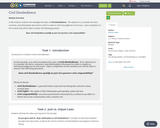
In this module, students will investigate the topic of civil disobedience. The objective is to consider the facts, scenarios, and philosophies discussed in order to make an informed judgment on the issue. Upon completion of this module they will be able to answer the following question: Does civil disobedience qualify as part of a person's civic responsibility?
- Subject:
- History, Law, Politics
- Political Science
- U.S. History
- Material Type:
- Module
- Author:
- Nathan Myers
- Date Added:
- 12/15/2016

This course centers on mechanisms of civilian control of the military. Relying on the influential texts of Lasswell, Huntington, and Finer, the first classes clarify the basic tensions between the military and civilians. A wide-ranging series of case studies follows. These cases are chosen to create a field of variation that includes states with stable civilian rule, states with stable military influence, and states exhibiting fluctuations between military and civilian control. The final three weeks of the course are devoted to the broader relationship between military and society.
- Subject:
- Arts and Humanities
- Philosophy
- Political Science
- Social Science
- Material Type:
- Full Course
- Provider Set:
- MIT OpenCourseWare
- Author:
- Petersen, Roger
- Date Added:
- 02/01/2003
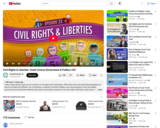
Today, Craig is going to give you an overview of civil rights and civil liberties. Often these terms are used interchangeably, but they are actually very different. Our civil liberties, contained in the Bill of Rights, once only protected us from the federal government, but slowly these liberties have been incorporated to protect us from the states. We’ll take a look at how this has happened and the supreme court cases that got us here.
- Subject:
- Political Science
- Social Science
- Material Type:
- Lecture
- Provider:
- Complexly
- Provider Set:
- Crash Course U.S. Government and Politics
- Date Added:
- 07/18/2015

In recent years both scholars and policymakers have expressed a remarkable amount of interest in the concepts of social capital and civil society. A growing body of research suggests that the social networks, community norms, and associational activities signified by these concepts can have important effects on social welfare, political stability, economic development, and governmental performance. This discussion based course examines the roles played by these networks, norms, and organizations in outcomes ranging from local public goods provision and the performance of democracies to ethnic conflict and funding for terrorism.
- Subject:
- Political Science
- Social Science
- Sociology
- Material Type:
- Full Course
- Provider Set:
- MIT OpenCourseWare
- Author:
- Tsai, Lily
- Date Added:
- 09/01/2004

This graduate seminar examines civic engagement in international, national and local environmental governance. We will consider theories pertaining to civil society development, social movement mobilization, and the relations that nongovernmental organizations (NGOs) have with governments and corporations. During the course of the semester, particular attention will be given to the legitimacy and accountability of NGOs. Case studies of NGO and community responses to specific environmental issues will be used to illustrate theoretical issues and assess the impacts that these actors have on environmental policy and planning.
- Subject:
- Applied Science
- Engineering
- Environmental Science
- Political Science
- Social Science
- Material Type:
- Full Course
- Provider Set:
- MIT OpenCourseWare
- Author:
- Carmin, JoAnn
- Date Added:
- 02/01/2005

This course surveys the social science literature on civil war. Students will study the origins of civil war, discuss variables that affect the duration of civil war, and examine the termination of conflict. This course is highly interdisciplinary and covers a wide variety of cases.
- Subject:
- Arts and Humanities
- History
- Political Science
- Social Science
- Material Type:
- Full Course
- Provider Set:
- MIT OpenCourseWare
- Author:
- Petersen, Roger
- Date Added:
- 02/01/2010
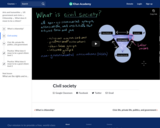
An overview of Civil society. Created by Kimberly Kutz.
- Subject:
- Political Science
- Social Science
- Material Type:
- Lesson
- Provider:
- Khan Academy
- Provider Set:
- Khan Academy
- Author:
- Kim Kutz
- Date Added:
- 07/16/2021
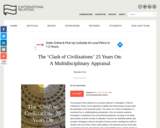
The purpose of this collection is to present Samuel P. Huntington’s ‘Clash of Civilizations’ thesis, and to appraise its validity and shortcomings 25 years after the publication of his landmark article.The notion of a ‘clash of civilizations’ is examined from a multidisciplinary perspective. First, the volume examines Huntington’s contribution from a theoretical perspective, focusing on his ideas about politics and the concept of civilization. Second, the individual articles also consider Huntington’s thesis in the light of recent events, including the conflict in Ukraine, the rise of ISIS, China–India relations, the electoral success of far-right movements in Europe, the refugee crisis in the Mediterranean and the activity of the International Criminal Court in Africa. In sum, this book offers a vibrant and multifaceted conversation among established and emerging scholars on one of the most important paradigms for the understanding of international politics.
- Subject:
- Political Science
- Social Science
- Material Type:
- Textbook
- Provider:
- E-International Relations
- Author:
- Davide Orsi
- Date Added:
- 03/08/2019
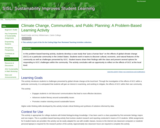
In this problem-based learning activity, students develop a case study that "puts a human face" on the effects of global climate change (GCC) on a particular community in the United States. Students work in teams to: discover cultural, economic, and natural features of the community; identify challenges presented by GCC; and identify options for responding to these challenges.
- Subject:
- Career and Technical Education
- Environmental Studies
- Political Science
- Social Science
- Material Type:
- Activity/Lab
- Provider:
- Science Education Resource Center (SERC) at Carleton College
- Provider Set:
- Teach the Earth
- Author:
- Amy Wilstermann
- David Koetje
- Date Added:
- 01/20/2023

The Defeat of Senate Bill 5 and the Struggle to Defend the Middle Class
Word Count: 97852
(Note: This resource's metadata has been created automatically as part of a bulk import process by reformatting and/or combining the information that the author initially provided. As a result, there may be errors in formatting.)
- Subject:
- History
- Political Science
- Social Science
- U.S. History
- Provider:
- University of Cincinnati
- Date Added:
- 08/23/2021

Students will define colorblind racism; identify the four frames through which colorblind racism operates; discern the effects of colorblindness in practice-particularly its negative aspects; and identify alternatives to colorblindness
- Subject:
- Political Science
- Social Science
- Sociology
- Material Type:
- Assessment
- Diagram/Illustration
- Interactive
- Module
- Provider:
- Oregon State University
- Author:
- Open Oregon State
- Oregon State University
- Date Added:
- 05/19/2021
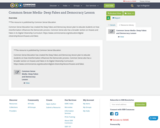
**The resource is published by Common Sense EducationCommon Sense Education has created the Deep Fakes and Democracy lesson plan to educate students on how misinformation influences the Democratic process. Common Sense also has a broader section on Hoaxes and Fakes in its Digital Citizenship Curriculum: https://www.commonsense.org/education/digital-citizenship/lesson/hoaxes-and-fakes
- Subject:
- Information Science
- Political Science
- Material Type:
- Activity/Lab
- Lesson Plan
- Author:
- Cyber Citizenship Initiative
- Date Added:
- 08/12/2021

In this seminar you will learn about the large land masses that cover planet Earth. We call these land masses continents. You will learn the names and locations of each continent. By the end of this seminar, you will be able to construct a map of the 7 continents.Standards7.1.4.B Describe and locate places and regions as defined by physical and human features.
- Subject:
- Political Science
- Social Science
- Material Type:
- Lesson Plan
- Author:
- Bonnie Waltz
- Deanna Mayers
- Tracy Rains
- Date Added:
- 10/13/2017
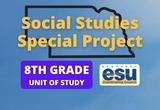
This inquiry leads students through an investigation of the communication between the Cherokee nation and the American government. Resource created by Lucas Spooner, Winnebago Public Schools, as part of the Nebraska ESUCC Social Studies Special Projects 2023 - Inquiry Design Model (IDM).
- Subject:
- History
- Political Science
- Material Type:
- Unit of Study
- Author:
- Nebraska OER
- ESU Coordinating Council
- Date Added:
- 08/02/2023

Short Description:
The Communist Manifesto (1848)—originally the Manifesto of the Communist Party—is a pamphlet by German philosophers Karl Marx and Friedrich Engels. The Manifesto was commissioned by the Communist League and first published in London during the start of the 1848 Revolutions. It is now recognized as one of the world's most influential political documents.
Long Description:
The Communist Manifesto (1848)—originally the Manifesto of the Communist Party—is a pamphlet by German philosophers Karl Marx and Friedrich Engels. The Manifesto was commissioned by the Communist League and first published in London during the start of the 1848 Revolutions. It is now recognized as one of the world’s most influential political documents.
Word Count: 11277
(Note: This resource's metadata has been created automatically by reformatting and/or combining the information that the author initially provided as part of a bulk import process.)
- Subject:
- Political Science
- Social Science
- Material Type:
- Textbook
- Provider:
- Toronto Metropolitan University
- Date Added:
- 02/15/2022

In this seminar you will learn about the jobs and responsibilities of community members. You will use the habit of mind remaining open to continuous learning to improve your own community. Then you will create an advertisement to persuade your community members to become more involved!Standards5.2.4.A Identify individual rights and needs and the rights and needs of others in the classroom, school, and community.
- Subject:
- Political Science
- Social Science
- Material Type:
- Lesson Plan
- Author:
- Bonnie Waltz
- Deanna Mayers
- Tracy Rains
- Date Added:
- 10/13/2017


